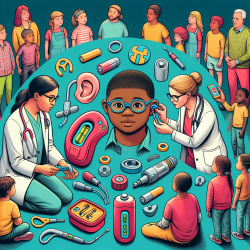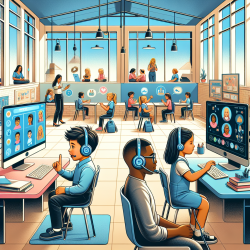Introduction
The COVID-19 pandemic has significantly disrupted the educational process worldwide, presenting both challenges and opportunities for innovation. As a speech-language pathologist passionate about creating great outcomes for children, it's crucial to explore how these changes can be leveraged to improve educational practices, particularly in online therapy services like those provided by TinyEYE.
Understanding the Impact
The research article titled "Explaining the experiences of nursing administrators, educators, and students about education process in the COVID-19 pandemic: a qualitative study" provides valuable insights into the educational shifts during the pandemic. This study highlights the experiences of nursing administrators, educators, and students, revealing key themes such as safe management in ambiguous situations, perceived stress, adaptive coping, educational facilitators and challenges, and the continuation of education in an uncertain context.
Key Findings and Their Implications
- Safe Management in Ambiguous Situations: The study underscores the importance of establishing health safety protocols and effective management strategies to navigate educational disruptions. For practitioners, this highlights the need for robust contingency plans and adaptive strategies to ensure educational continuity.
- Perceived Stress and Coping Mechanisms: The pandemic has heightened stress levels among educators and students. Recognizing and addressing these stressors through supportive measures and resilience-building activities can enhance mental well-being and learning outcomes.
- Educational Facilitators and Challenges: While the pandemic has posed significant challenges, it has also catalyzed the adoption of innovative educational technologies. Embracing these technologies can enhance accessibility and engagement in online therapy services.
- Continuing Education in an Uncertain Context: The shift to virtual learning environments has necessitated new pedagogical approaches. Practitioners should focus on integrating interactive and engaging content to maintain student interest and motivation.
Opportunities for Further Research
The findings from this study open avenues for further research into effective educational strategies during crises. Practitioners are encouraged to explore the following areas:
- Developing evidence-based interventions to support mental health and resilience in students and educators.
- Investigating the long-term impacts of virtual learning on educational outcomes and student engagement.
- Exploring the role of technology in enhancing communication and collaboration in online therapy services.
Conclusion
The COVID-19 pandemic has reshaped the educational landscape, presenting both challenges and opportunities. By leveraging the insights from this study, practitioners can enhance their skills and improve educational outcomes for students. Embracing innovation and resilience will be key to navigating the evolving educational environment.
To read the original research paper, please follow this link: Explaining the experiences of nursing administrators, educators, and students about education process in the COVID-19 pandemic: a qualitative study.










